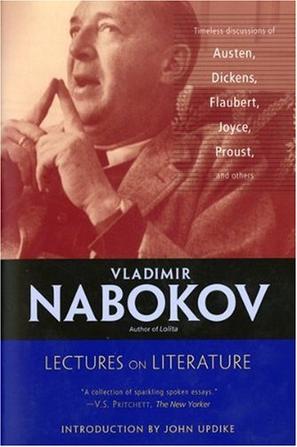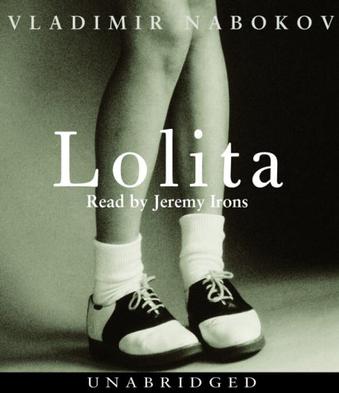-

Lolita
Awe and exhiliration--along with heartbreak and mordant wit--abound in Lolita, Nabokov's most famous and controversial novel, which tells the story of the aging Humbert Humbert's obsessive, devouring, and doomed passion for the nymphet Dolores Haze. Lolita is also the story of a hypercivilized European colliding with the cheerful barbarism of postwar America. Most of all, it is a meditation on love--love as outrage and hallucination, madness and transformation. -

Lectures on Russian Literature
The author's observations on the great nineteenth-century Russian writers-Chekhov, Dostoevsky, Gogol, Gorky, Tolstoy, and Turgenev. "This volume... never once fails to instruct and stimulate. This is a great Russian talking of great Russians" (Anthony Burgess). Edited and with an Introduction by Fredson Bowers; illustrations. -

Lectures on Literature
For two decades, first at Wellesley and then at Cornell, Nabokov introduced undergraduates to the delights of great fiction. Here, collected for the first time, are his famous lectures, which include Mansfield Park, Bleak House, and Ulysses. Edited and with a Foreword by Fredson Bowers; Introduction by John Updike; illustrations. -

巨匠丛书 第五部 纳博科夫小说全集 第二辑
天才作家空前绝后的作品。——纽约时报书评 前言 这本小说俄文原名是PRIGLASHENIE NA KAZN'。要不是后缀重复,我会建议把它译成《行刑的邀请》,但另一方面,我用母语本来想说IGLASHENIE NA ORSE- CHONIE GOLOVI (《杀头的邀请》),只是读起来同样不顺口。 俄文原著是正好四分之一世纪前在柏林完成的,即从苏联逃离十五年后,也就是纳粹制度达到顶峰之时。至于我所见到的属于同种无聊、眼盲闹剧的两种制度对这本书的影响,好的读者与我一样不必多究。 “PRIGLASHNIE NA KAZN'”以连载的形式在巴黎的一本俄罗斯移民杂志上刊登,后来在1938年,OMKNIGI 在同一城市上出版了它。移民评论者对这本书有些困惑,但还喜欢它。他们觉得在这本书中辨别出了“卡夫卡”的笔调,却不知道我不懂德语,对现代德国文字一无所知,也未读过卡夫卡作品的任何法文和英文译本。毫无疑问,这本书与我以前的小说(或后来的‘BEND SINIS- TER')确有风格上的联系,但与《城堡》和《审判》(THETRIAL)之间并无联系。在我的文学评论概念中思想类同并不重要,但如果我确实要找一个同宗灵魂的话,我 肯定要选那位伟大的艺术家,而不是G.H.奥威尔和其他大众化的画报思想家和政论小说家,我无法理解为什么我的每一本书都毫无例外地让评论家们忙于寻找那些多少有些名气的名字以作出充满激情的比较。过去三十年中他们把这些名字投向我(仅仅列出几个并无伤大雅的名字):果戈里,托尔斯泰,乔伊斯,伏尔泰,萨德,斯丹达尔,巴尔扎克,拜伦,普鲁斯特,克莱斯特,玛丽·麦卡锡,梅雷 迪思(!),塞万提斯,查理·卓别林,普希金,甚至还有塞巴斯蒂安·奈特①。但是有一位作者从未被与我有关地提起过——这是我要承认在我写这本书时对我有影响的惟一一位,我也对其感激不尽的作家,说来就是那位忧郁的,夸张的,智慧的,风趣的,有魔力的,总而言之令人愉快的皮尔·DELALANDE ——我虚构的名字。如果有一天我编一本满是定义的字,要找些单字做字头的话,需要一个字头的一条值得珍爱的定义就是“节略、扩充、或者更改、或者使被更改,以便在翻译自己的作品时有所改进”。大体说来,改动的欲望与译文和原文出现的时间差成正比增加,但当儿子让我检查这本书的译本而我不得不重新阅读俄文原稿时,我松了口气,感到我不需要与创造性修改这个恶魔打交道。1935年我的俄文 短语准确表达了那些幻觉,而把它译成英语时惟一有益的更改按惯例就行了,因为英语好像不像俄语那样做作就能表达清楚。我儿子证明了自己是非常通顺的译者。我们之间达成一致:重要的是要忠于原作,不论结果多么怪诞。学究万岁,让那些以为只需“精神”保留(而其本身变为无知、粗俗的欢闹——比如莫斯科的郊区,而莎士比亚被丑化为只是耍弄国王的魔鬼而已)则万事大吉的傻瓜滚蛋吧。 《斩首的邀请》只是真空中的小提琴。俗人会把它看作戏法。老人会马上抛开它转向浪漫故事和公众人物的生活。没有俱乐部女会员会喜欢它。心怀不正的人都会在小埃米身上看到洛丽塔②(早熟的性感姑娘——译者),维也纳巫医的信徒会在自己的公共罪过及PROGRESIVNOE教育的实践中对它暗笑。但是(正如‘DISCOURS SUR LES OMBRES’的作者对灯光作出的评论):我知道(JE CONNAIS) 几个(QUELQUES)读者会跳起来,弄乱头发。 于亚利桑那州 -

Speak, Memory
A rich evocation of Nabokov's life and times, even as it offers incisive insights into his major works, including LOLITA, PNIN, DESPAIR, THE GIFT and others. -

Lolita
(Book Jacket Status: Jacketed)When it was published in 1955, Lolita immediately became a cause célèbre because of the freedom and sophistication with which it handled the unusual erotic predilections of its protagonist. But Vladimir Nabokov's wise, ironic, elegant masterpiece owes its stature as one of the twentieth century's novels of record not to the controversy its material aroused but to its author's use of that material to tell a love story almost shocking in its beauty and tenderness. Awe and exhilaration–along with heartbreak and mordant wit–abound in this account of the aging Humbert Humbert's obsessive, devouring, and doomed passion for the nymphet Dolores Haze. Lolita is also the story of a hypercivilized European colliding with the cheerful barbarism of postwar America, but most of all, it is a meditation on love–love as outrage and hallucination, madness and transformation.With an Introduction by Martin Amis From the Hardcover edition.